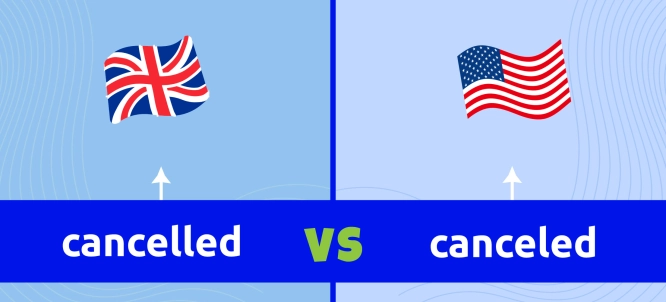by PushtoLearn
Cancelled or Canceled
Table of Contents
Cancelled or Canceled - Exercises and Quiz
These exercises focus on US and UK spelling.
What Do "Cancelled" and "Canceled" Mean?
Both words come from the verb cancel, which means to stop or call off something. For example:
-
"The event was canceled because of the rain."
-
"The flight was cancelled due to bad weather."
The difference lies in spelling:
-
Canceled is the American English spelling.
-
Cancelled is the British English spelling.

The Rules: When to Use "Cancelled" or "Canceled"
|
Country |
Spelling |
Example Sentence |
|
United States |
Canceled |
"The concert was canceled at the last minute." |
|
United Kingdom |
Cancelled |
"The show was cancelled because of illness." |
|
Canada & Australia |
Cancelled (preferred) |
"The meeting was cancelled yesterday." |
Why Are There Two Spellings?
The difference comes from how English developed in different regions.
-
American English simplifies spellings by dropping extra letters. This is why Americans use canceled (with one "l").
-
British English tends to keep the traditional spelling with two "l"s, so cancelled is standard there.
This pattern applies to many words ending in -l when adding a suffix like "-ed" or "-ing."
Common Errors and How to Avoid Them
Here are a few mistakes ESL learners often make:
-
Using both forms in the same text:
Incorrect: "The game was canceled due to rain, but the cancelled party will be rescheduled."
Correct: "The game was canceled due to rain, but the party will be rescheduled." (American style) -
Forgetting the audience:
If your audience is in the U.S., stick to canceled. If they’re in the UK, use cancelled. -
Thinking one is wrong:
Both spellings are correct depending on the region, so neither is a mistake!
Everyday Use of "Cancelled" and "Canceled"
Both words are commonly used in real-life situations:
-
Travel:
-
"My flight was canceled because of snow." (American)
-
"My flight was cancelled because of snow." (British)
-
Plans:
-
"The meeting was canceled." (U.S.)
-
"The wedding was cancelled." (UK)
-
Entertainment:
-
"The TV show was canceled after one season." (American)
-
"The play was cancelled due to low ticket sales." (British)
FAQs About Cancelled vs. Canceled
Is "canceled" or "cancelled" more popular?
In the U.S., "canceled" is more common. In the UK, Canada, and Australia, "cancelled" is preferred.
Why does British English use two "l"s?
British English follows older spelling rules that retain the extra "l."
Is there a difference in pronunciation?
No, both words are pronounced the same way, regardless of spelling.
Are there other words like this?
Yes! Words like "travelled/traveled" and "labelled/labeled" follow the same pattern.
Which should I use for international writing?
If your audience is international or unclear, you can use either spelling, but it’s a good idea to stick to one style throughout your writing.
